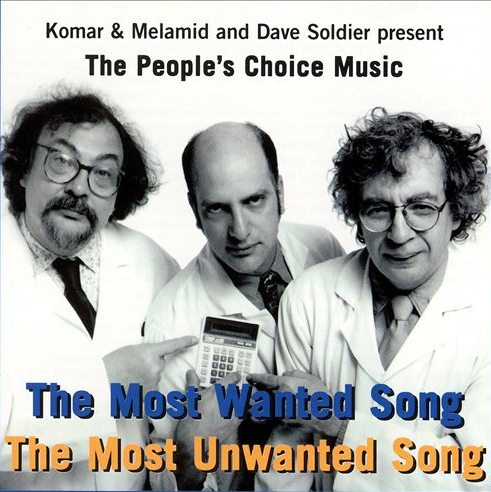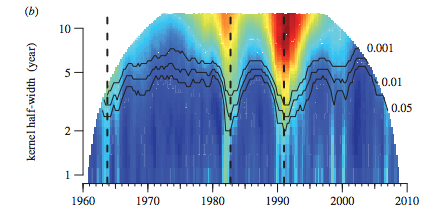In 1996-1997 the artist duo Komar & Melamid hired professional polling companies to conduct a worldwide survey of musical tastes. Based on the averaged results, they partnered with musician Dave Soldier to create "The Most Wanted Song" (described as "Celine-Dion-esque") and "The Most Unwanted Song" (bagpipes, children's choir) in the world. This project, part of their series People's Choice (which included a net art commission for the Dia), was at once an earnest attempt to better understand mainstream aesthetic tastes and an ironic statement about the absurdity of trying to quantify those tastes via statistical averages.

Cover art for The People's Choice Music by Komar & Melamid and Dave Soldier.
In April 2015, a group of British biologists published a study in The Royal Society journal that similarly compresses musical trends into data, in this case applying much more technology and much less humor. In the survey "The Evolution of Popular Music: USA 1960-2010," Matthias Mauch, Robert M. MacCallum et al. analyze the chord and tone patterns of 30-second clips from over 17,000 songs appearing on the Billboard Hot 100 chart within that 50 year period, applying, according to them, a similar approach to paleontologists examining the fossil record. Besides giving insight to pop history, they hope to point "the way to a quantitative science of cultural change." Why, the researchers ask, can't musicology be more like evolutionary biology?
The study makes several claims about musical trends, such as that there have been three major music "revolutions" since 1960: a big spike in 1991 and two smaller peaks in 1964 and 1983. There were also lulls: 1986 was the least diverse musical year they identified, which they attributed to the introduction of drum machines and synthesizers. And in terms of major movements over that whole time span, they discovered, lo and behold, that "rise of RAP and related genres appears […] to be the single most important event that has shaped the musical structure of the American charts."

Image: Royal Society Open Science
The biggest bomb the authors drop is explosive enough to warrant its own declarative section title: "The British did not start the American revolution of 1964." According to the scatter plot, British bands like The Beatles may have contributed, but were not responsible for, the major innovations of the 60s. Coming from British researchers, we can rest assured that this fact must be truly objective.
Since "Popular music genres such as COUNTRY and RAP partially capture musical styles but, besides being informal, are also based on non-musical factors such as the age or ethnicity of performers," the researchers needed to make sure that their computer-generated genre categorization matched those of humans, who, unlike algorithms, subtly incorporate assessments like "she's black" into their musical classifications. To do so, they compared their algorithmic discernments with genre-tags made by the approximately 50 million users of music streaming website Last.fm (a data scientist from Last.fm is also listed as a study author), and found a high level of correspondence.
While this is a cool triumph for mass data analysis, the conclusions one can reasonably draw from it are limited. Admittedly, their "measures must capture only a fraction of the phenotypic complexity of even the simplest song"—or, as John Kovach puts it in an article for New Scientist, taking a 30-second clip of a song like "Bohemian Rhapsody" and using it as exemplary of the whole thing is a bit ridiculous. Kovach also rightly questions the British Invasion conclusion, given that the Beatles, for instance, never even released a single from the album Sgt. Pepper's Lonely Hearts Club Band that could have ended up on the Hot 100.

Extra points for a scientist on lead guitar.
But the most important obstacle to treating musicology as hard science, as is so often when someone boringly tries to naturalize cultural processes, is that the study obfuscates as much as it reveals. The "evolution" of music has been genetically modified throughout the last century by the music industry. Record companies have long been known to manipulate and sway the ratings, not to mention deciding who gets to make what kind of music in the first place by selecting for those "non-musical factors" like ethnicity, gender, age, weight, hair, and on and on. The report states: "we did not attempt to obtain a representative sample of all the songs that were released in the USA in that period of time, but just those that were most commercially successful." As a result, this study does not demonstrate that musical innovation spiked or that styles diversified at certain times. It won't tell you about the emergence of rock steady in Kingston; it will only tell you about the products of a profit-driven US-dominated industry with its own inherent bias, without exposing this bias to scrutiny. If human activity is now understood as a direct influence on the evolution (and extinction) of other species, corporate influence is the natural environment that shapes the evolution of culture, according to the researchers' definition. Anthropocene; Corporatocene.
Instead of casting light on the corporatocene, the study merely amplifies its effects. If it's now possible to better understand long-term trends in music, it's also now likely that these findings will be applied to future industry decision-making. That's something the study's buddies at Last.fm, a company that proudly announces "Whatever you're listening to and wherever you're listening to it from—we know about it," must have realized at some point during this collaboration with big science. The familiar feedback loop of institutional bias ensues, with bias now written into the data model. "No doubt some will disagree with our scientific approach and think it's too limited for such an emotional subject," says co-author Matthias Mauch. But it's not emotion that is lacking from this study. It's science. Science, and Alton Ellis.

